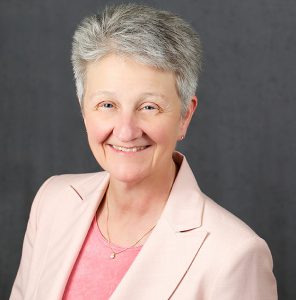WE ARE PROMOTING A HEALTHIER WORLD
At the University of Washington, we believe improving population health worldwide is a moral imperative. With the support of donors and advocates, UW experts have long worked at the intersection of human health, environmental resilience, and social and economic equity, examining all the factors that impact people’s health and well-being. The importance of that expertise has never been clearer, as the UW continues to provide leadership, care and guidance for our state and country in response to COVID-19. From lifesaving testing and care, to rapid-response grants helping interdisciplinary teams study and respond to the COVID-19 pandemic and other global health crises, to the future Health Sciences Education Building, a collaborative hub for innovative research, teaching and learning — the UW will promote health, save lives and drive transformative change far into the future.
TALKING ABOUT CANCER
When Donna L. Berry, Ph.D. ‘92, R.N., AOCN, FAAN, created her first health informatics project, the term “health informatics” didn’t even exist. The UW School of Nursing alumna was simply implementing her dissertation: an exploration of how men with prostate cancer made treatment-related decisions.

“Back in the early 1990s, men were so confused,” says Berry, a UW professor in Department of Biobehavioral Nursing and Health Informatics. “There was no one best treatment for low-risk prostate cancer, so doctors would present the options, then ask their patients, ‘Well, what would you like to do?’”
Confused by their choices — and worried about the potential of losing genitourinary control and function — men would often consult friends and co-workers rather than talk to their clinicians.
“I wanted to build an intervention that honored these concerns,” Berry says. “At the same time, I wanted to educate men on the bigger picture and to coach them in talking to doctors about the things that were important to them.”
Thus began the development of the Personal Patient Profile-Prostate or P3P. Today, this web-based health informatics tool leads men with prostate cancer through a series of questions. The tool then helps patients understand their options, talk to their doctors and make informed decisions.
The development of P3P contributed to Berry being awarded the Health Informatics Endowed Professorship in Nursing, a position created with a gift from professor emerita Marjorie V. Batey, BSN ‘53, Ph.D., FAAN. Berry’s work on the Electronic Self-Report Assessment-Cancer, a tool that helps patients evaluate and communicate about their at-home symptoms, was almost certainly another factor.
Dr. Berry’s deep commitment to helping trainees also played a role in her receipt of the professorship; over time, she has mentored more than 100 students and junior investigators from multiple disciplines, including nursing, medicine and epidemiology.
“There’s nothing more important than mentoring,” says Berry.
Endowed professorships confer both prestige and resources, and Berry intended to use the funds, in part, to present research results at a conference in Washington, D.C. When COVID-19 interrupted that plan, she devised a new one. First, Berry intends to conduct a pilot study to bring P3P into urology practices. Then, in 2021, she hopes to use the professorship to present a continuing education course for her colleagues.
More generally, professorship-provided funding will allow Berry to continue to make important contributions to the school’s programs in health informatics — and in mentoring students interested in those programs.
Berry is proud of holding the professorship and grateful for the resources that Batey has made available. Most of all, she appreciates the opportunity to keep her patients healthy and well-informed.
“With Marge’s support, I’m absolutely certain that we are making a difference in the lives of people with cancer,” Berry says.